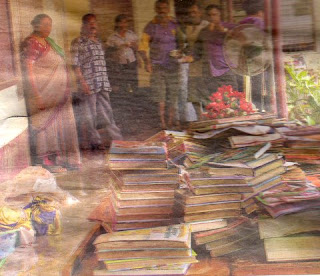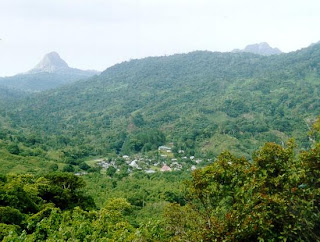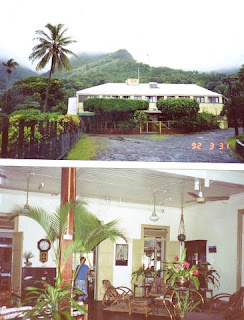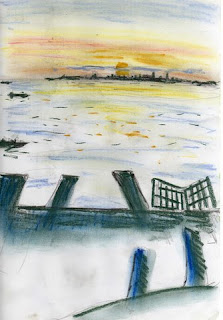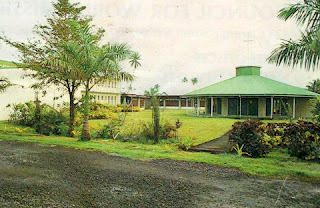from w
The ordinary Fiji people have plenty to say, judging by forums, letters to the editors, have your say. Here are a few responses to the situation that arose yesterday when the Interim Prime Minister suspended the Council of Chiefs because they did not endorse the nomination of Ratu Epeli Nailatikau as Vice President.
From Fiji Sun yesterday
Meant to be leaders?
Dr. Fereti Seru Dewa
SuvaIt is interesting to observe the Great Council of Chief's deliberations about the vice president. The Roko Tui Dreketi claims that chiefs are "meant to be" leaders. Those that claim to support tradition, however, have not observed the tradition that the GCC endorses the President's nominations. It seems that tradition is meant to be observed only when it suits the purpose of those observing it. In fact there is nothing traditional about the GCC or even the chiefs' positions. These are all, creations of British imperialists who diverted the natural order of Fijian society to make it easier for them to rule. Similar structures were set up in all colonies, worldwide, which were neither about preserving tradition nor about moving countries to democracy but simply about keeping the peace and making the imperialists' lives easier. Our neighbour Tonga is a case in point.
Traditionally Fijian society prior to contact with Europe was led by chiefs who earned the right to rule, not just by their birthright but by their intelligence, their ability to lead their people wisely and their prowess in battle. A leader who did not protect his people effectively and lead them wisely was soon overthrown. One of our great leaders did in fact say "If you cannot measure up, stand down" or something to that effect. The essential difference is that between a leader and a chief. Leadership is not inherited but earned through hard work and good governance. Many modern day chiefs may want to hide under the umbrella of chiefs such as Ratu Mara who were both chiefs and great leaders. They ask us to believe that their abilities were down to the fact they were chiefs rather than great leaders and exceptional individuals.
Good leaders should be supported by their people for who they are, not for who their father was. They should lead wisely and plough back the money earned from leases to improve our environment, their people's homes, schools and medical centres. How can chiefs expect respect when they keep these proceeds for their own use when their people live in poverty? Leadership by birthright is not compatible with a modern democracy. It is time to move on. Nowhere in the world have indigenous people won rights by sticking to hereditary hierarchies. The rights of indigenous Fijians will not be won by sticking to hereditary hierarchies. The rights of indigenous Fijians will be won by working with all racial groups in our society through the ballot box through the chiefly system or the GCC.
-----------
From Fiji Times: Some responses: Your Say Current Topic
The interim PM has announced the suspension of further GCC meetings and the reallocation of their budget. Is this the correct way to handle the situation? Is the GCC being manipulated, and if so, by whom? Laite of USA (3 hours and 18 minutes ago)
A suspension does not mean a complete removal of anyone or as in this case, complete removal of an entity. Bainimarama and the IG needs to use this suspended time wisely.
I think the suspension is simply a ploy to give more time to the Interim Government to take a deeper look at the GCC... its functions, responsibilities, fiscal integrity, strengths, weaknesses, and what its role should be in the future.
Some of us are old enough to know that our modern day GCC is as far away from how we viewed and revered them then as they are today. That is, the vanua was well taken care of, and managed accordingly from the Provincial Councils down to the Turaga Ni Koro. Now we see the degradation of Fijian societies across the country with the people of the vanua moving to cities and towns and adding to the unemployment and poverty numbers. There is no shame like the one you feel when you are poor in your own land.
The GCC as a polarizing factor for the vanua and the country, has become heavily politicized to gain any respect from the educated Fijians who truly care about the vanua.
The 1997 Constitution, which gave this august body more power than perhaps it deserves, has given rise to the number of political seekers within the GCC. For two reasons:
1. the electoral system has remained the same, that is, communal, which means easy votes for chiefs from their people in the vanua.
2. parliamentary set up that allows them to sit at the Upper House without being elected to it, if not by the whole country, then at least by the people of the vanua, and not by the GCC or the PM.
This coup was not backed by the GCC, therefore, some of its members who were ousted by Bainimarama are among the GCC members who voted against the President's nominee.
So, either they denied the nomination because they are angry at Bainimarama for not having them on board during the coup, for being ousted, or for being influenced by the anti-Bainimarama GCC members from the Methodist Church....it was a losing situation from the get go.
Manipulation? Big time. By disgruntled members, ousted cabinet members, Methodist Church members, and their combined political ideology as a whole.
1.
Savusavu@CalgaryCanada of Canada (2 hours and 5 minutes ago)
Don't anyone care any more about what the "people" want and what the "people" have to say. What happened to the old and new teaching I ELect my leader and government. Way to go GCC when push comes to shove, you have done a good job. Fiji has a beautiful historic culture and values, as much as possible keep in touch with the historic culture and values.
2.
Bowman of New Zealand (1 hour and 39 minutes ago)
Is there any other well educated chief out there to take that post (VP), that they only picking on those who just volunteer themselves because they cannot win any seat during normal election.
Slack tactics PM & President.
3.
Osama of Fiji (1 hour and 10 minutes ago)If you don't like what they say, sack them! That's the hallmark of VB.
It's not a question of whether the GCC is right or wrong, or if they should or shouldn't be there; the question is, "What gives VB the right to suspend them?"
This is an insult to Fiji.
4.
crooked of New Zealand (38 minutes ago)Theres two things in this topic to ponder about.
Suspension means they can have the meeting latter and reallocation means no more council of chiefs meeting.
It's a bit confusing, however let's get back to the basics on what the constitution say about Vore's action: is it legal or illegal.
If it's illegal that's the court to solve and if its legal let him please himself because all his actions will only prolong his term behind bars.
Another point to ponder how these chiefs are being nominated to be member of the GCC. I believe if we go back to the basics there were only about 13 chiefs (if my memory is correct) real chiefs I mean who signed the deed of cession at Levuka on behalf of all the Fijian chiefs whom we see nowadays. Ma'afu was one of the Tongans who signed, so I also believe that if we recognise the deed of cession then Nailatikau can represent Ma'afu because they are both Tongans.
Where are all these chiefs coming from? If we keep this trend we will end up with the saying "there's too many chiefs with no Indians around"
5.
Davenport-Larking The GCC had become politicised, and were doing a publicity stunt. (28 minutes ago)
The GCC would have rejected "any" 2nd VP, or 3rd nomination made by the president, had further meetings been allowed to continue.
They were using political arguments to reject the VP nomination. The writing was on the wall.
When you are a PM, or a Minister, especially in Fiji, with a road-map with a limited time frame, and pressure from the international community to meet dead-lines as quickly as possible, you can't get mucked around by publicity-political-stunts.
Prime Minister Bainimarama, and his Fijian Affairs Minister have shown foresight, and nipped this thing in the bud.
There's going to be a whole more of these "stunts", just like there has always been.
This time round, however, good governance/leadership/swift decision making is going to behaviourally modify the trouble-makers, once and for all.
This time round the road out of "third-worldness" is going to happen, because no road-blocks, or delays will be tolerated.
And the credible international community are becoming assured that a stable socio-economic environment will prevail.
And the people are being assured, that staying, or growing new businesses, building their house, keeping their educated children in Fiji, is the right decision now.
6. Historian of Suva (22 minutes ago)
Well done Frank for taking the first step towards removing the so called 'Great' Council of Chiefs. This group was a device constructed by the British Colonial Government solely to make Fiji administration easier. It is certainly not "ancient" as some people have written. These days it has entirely outlived its usefulness. (What was it doing between 1914 and 1987?) Nowadays it is costly, racist, ignorant and hopelessly undemocratic.
To media reporters: Please stop using the expression "august body". Many of you appear to think it means 'August body'. Look up the word 'august'. It is probably the last adjective anyone would use to describe the GCC anyway!

